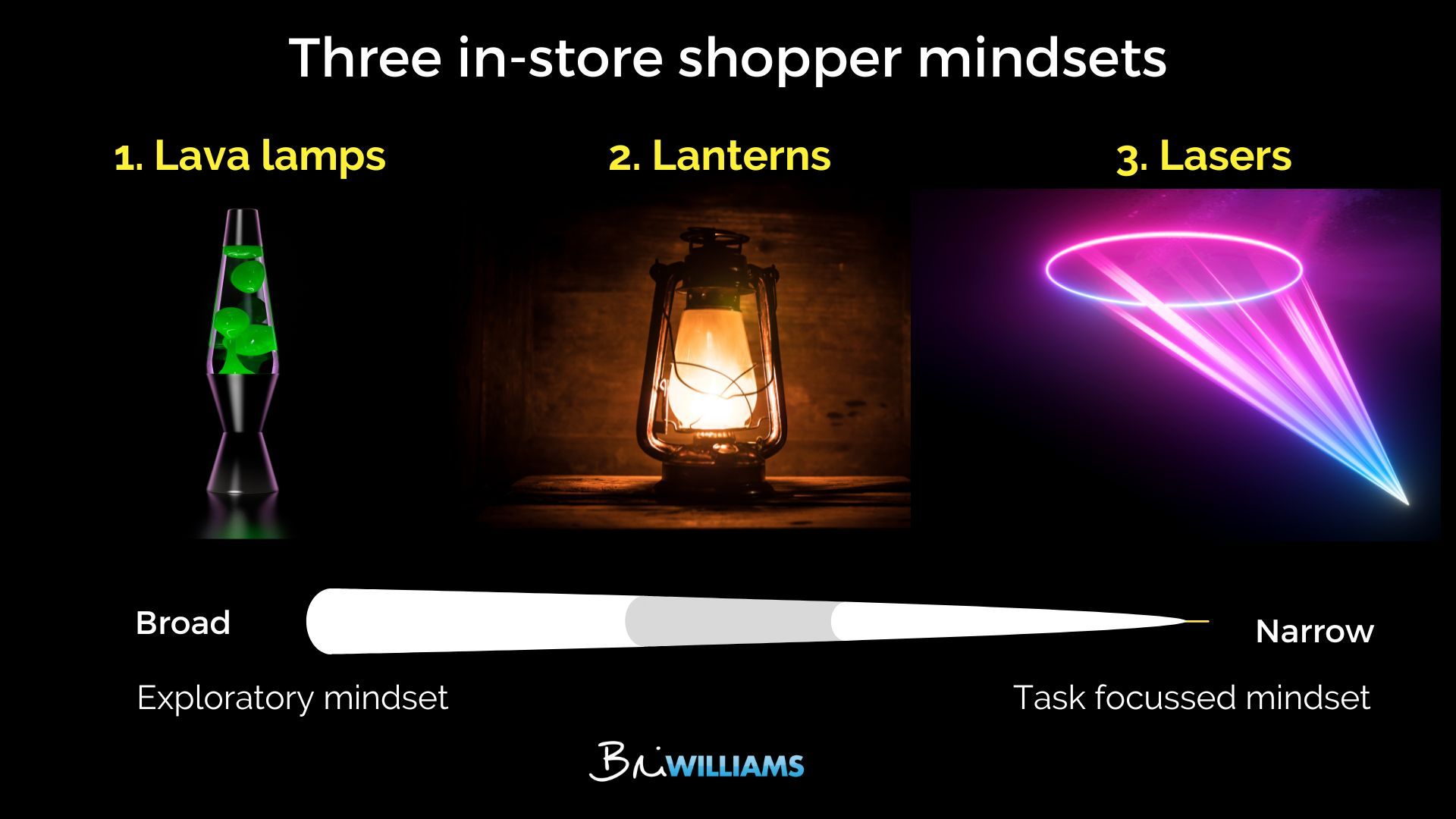3 shopper mindsets

I’m preparing for a keynote to a retail group in a couple of weeks, so I’ve been thinking about how they can better engage with in-store shoppers.
As I see it, there are three shopper mindsets that vary according to task orientation:
- Lasers,
- Lanterns and
- Lava Lamps.
I’m using light as the metaphor to represent how diffused their focus is.
At one end of the task orientation scale, Lasers are laser focussed on what they need to buy. They want to get in and get out, so don’t get in...
Dislodging status quo
There’s only one reason why your customers aren’t buying.
Status Quo Bias.
Which means I have some good news and bad news for you.
The bad news? For them, doing nothing is better than doing something. Choosing not to proceed is better than proceeding.
The good news? Now that you know that we can do something about it.
Take this ad from Apothecary, for example. They’re trying to replace using wine to wind down with their herbal remedy.

So, what are they doing well, and what should they...
Refunds get spent like free money

Research confirms what you may already know to be true.
People are more likely to spend refunded money.
Let’s say you return a $100 jacket. According to Yu, Cryder and LeBoeuf (2024) you are more likely to spend that $100 refund on a discretionary purchase than if you’d received the same amount as either income, an unexpected windfall or even a tax refund.
That’s because the money has already been designated as ‘spent’.
It feels like free money because it comes without obligation - you ...
Zebra crossing

There’s a zebra crossing that runs between my two local supermarkets.
To use it, people have to go out of their way about 10 metres.
Instead, a majority run the gauntlet, crossing the busy and chaotic road at a more convenient point.
People on walking frames. People with shopping bags. People with pets and children. Me.
We’re willing to sacrifice safety for convenience.
What’s the trade you are asking people to make?
➡ When it comes to your processes and procedures, are you assuming p...
Should you really promote how new something is?
Should you promote that something is new? Like under new management or a new product release?
In this video I share:
- new research on 'revision framing';
- whether people prefer something new over a functionally superior option; and
- how customer expertise changes things.
This is a sample of content from the Just Do This small business program. Find out how you can join.
Two types of hows
What is your customer really asking for?
Customers often use “how” questions to find you, like “how to increase sales” or “How to improve conversion?”
But not all “how” questions are alike.
In fact, there are two types of “hows”.
👉 If you’re answering the wrong type of how, you won’t capture their attention.
The first type of “how” question is procedural.
Questions like “how to change a tyre” or “How to cook salmon”
Or in business, “how to create a TikTok” or “How to calculate tax”.
...Typing vs. telling
Typing rather than talking changes behaviour.
Customers are more willing to buy, for example, when they type their search rather than use a voice assistant like Siri or Alexa.
When we type, we subconsciously associate it with taking action.
When we use a voice assistant, we instead associate it with gathering information and deliberating.
Unfortunately, customers are unlikely to tell you they decided to buy because they typed rather than talked. They can’t.
They won’t imagine it’s possi...
How to sell if you don't like selling
I hate selling.
Now, that's a problem if you are someone like me who runs their own business, or you're in a role that requires you to bring in the dollars.
Or maybe you are trying to 'sell' your credentials in a job interview or sell the benefits of a new project?
Bottomline, how to sell if you don't like selling?
In this video I explain how to think differently about selling, and the ONLY three reasons people don't buy.
This is a sample of content from my Just Do This membership program. ...
Influencing people to give a "crap"
Who Gives a Crap is a fast growing, direct-to-consumer social enterprise in the toilet paper business.
For my Just Do This members last month, I did a deep dive into five techniques they use to influence customer behaviour.
So you can sample Just Do This content, I've decided to share this video with you.
In it I cover:
- Onboarding email messages
- How they build customer confidence
- What sender address and subject lines they use
- How they cleverly communicated a price rise
- The importance o...
Five pitfalls of behavioural economics
There is plenty of upside in applying behavioural science, but there are five pitfalls that you should know about too.
In this video I’m going to take you through the 5 pitfalls of behavioural economics, and how to avoid them.
Pitfall #1. Thinking it only applies to customers
Behavioural economics is the study of how emotional, social and cognitive biases and heuristics impact behaviour.
Behaviour is the operative word here, because the same forces that impact your customer are impacting y...

